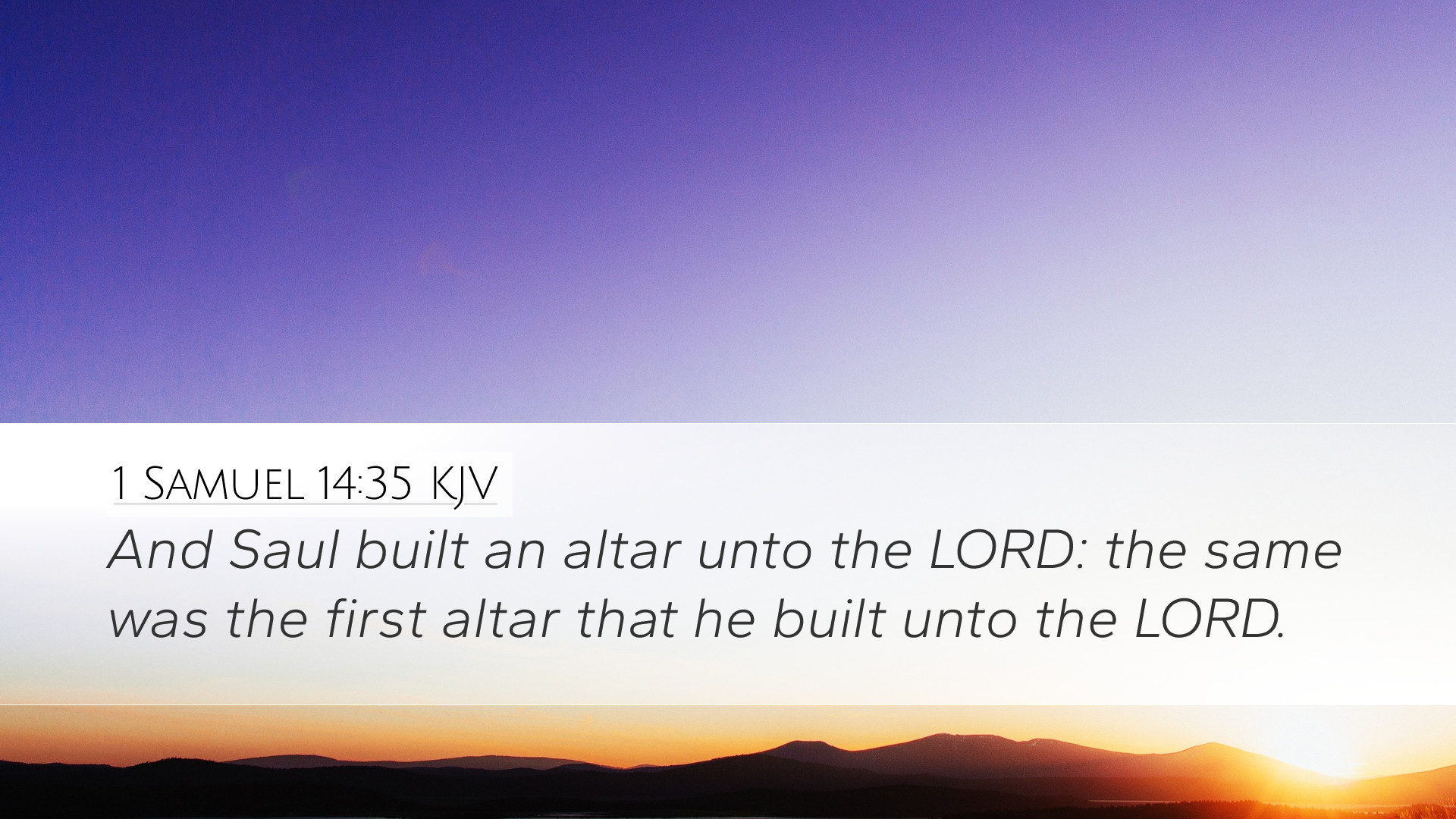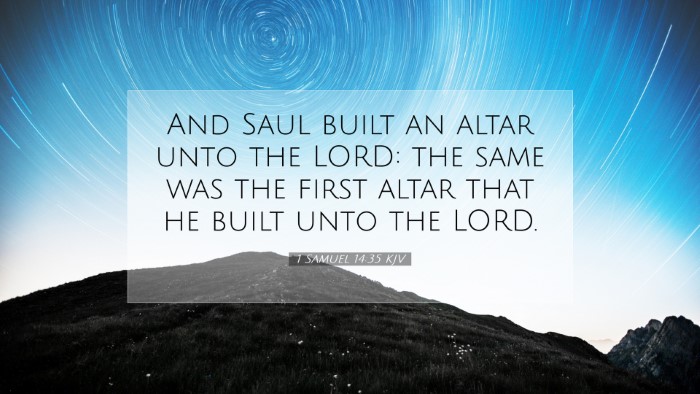Commentary on 1 Samuel 14:35
Verse Reference: 1 Samuel 14:35 (KJV): "And Saul built an altar unto the Lord: the same was the first altar that he built unto the Lord."
Introduction
This verse serves as a pivotal moment in the narrative of Saul's kingship, illustrating the complexities of his relationship with God and his evolving understanding of worship. Saul's actions in this context provide fertile ground for analysis regarding the covenant community's worship practices, leadership responsibilities, and the theological implications of seeking God’s favor.
Historical Context
Leading up to this verse, Saul had been involved in a conflict with the Philistines, reflecting the ongoing struggles of Israel during the judgeship and early monarchy. The significance of building an altar at this point signals an attempt by Saul to align himself with divine favor after a series of problematic decisions, including an ill-fated oath made during battle.
Commentary from Matthew Henry
Matthew Henry notes the importance of Saul's act of building an altar, emphasizing that this act was a sign of his recognition of the need for divine assistance. He points out that building an altar was a significant spiritual act—indicating Saul's desire to make amends and seek God’s guidance.
- Seeking God: Henry emphasizes that Saul's altar serves as an acknowledgment of his need for God’s intervention, particularly following his rash decisions during warfare.
- Symbolism of the Altar: The altar represents not only a place of sacrifice but also a commitment to worship, showcasing Saul’s potential to re-establish a relationship with God.
- Contrast with Later Actions: Henry suggests that this moment serves as a foreshadowing of Saul’s eventual decline—a reminder that initial steps towards faith do not guarantee endurance in the path of righteousness.
Commentary from Albert Barnes
Albert Barnes provides further insights into the significance of Saul’s altar construction, noting that it was indeed the first altar Saul constructed, which is deeply symbolic. This act highlights a transitional moment in Israel's history where leadership and worship become intimately connected.
- First Alteration: Barnes points out that the mention of this as the "first altar" indicates a shift, showing that prior to this, Saul may not have been engaging in covenant worship or rituals that were integral to Israel's identity.
- Leadership Responsibilities: He notes that as king, Saul had a responsibility to guide the people towards proper worship and devotion to God, a role he began to fulfill at this moment.
- Covenant Theology: Barnes emphasizes the theological implications of the altar, showing it as a means to restore covenant relationships which underscores the entirety of Israel's faith and dependence on God.
Commentary from Adam Clarke
Adam Clarke examines the implications of Saul's action, interpreting this altar as not only a response to immediate needs but also a reflection of broader themes within Israelite worship. Clarke's observations lead to profound theological reflections from this seemingly simple verse.
- Historical Psychology of Worship: Clarke discusses how the act of building an altar can reflect the psychological state of leaders and their understanding of divine favor.
- First Altars and Identity: He notes that the construction of altars throughout the Old Testament signifies the identity and collective memory of the people of Israel.
- Faith and Practice: Clarke integralizes the idea that worship should not become merely ritualistic; rather, it must stem from genuine faith and intent, pointing to Saul’s mixed motivations.
Theological Implications
The construction of the altar presents rich theological themes worth pondering, particularly within the realms of leadership, community, and personal piety.
- The Role of Leaders: Saul's decision to build an altar signifies the necessity for leaders to seek divine approval and intercession. This principle extends into contemporary church leadership, emphasizing prayerful dependence on God.
- Collective Worship: The altar serves as a communal focal point for worship, pointing to the collective nature of faith and the necessity of shared spaces for spiritual engagement.
- Consequences of Leadership: Saul’s initial act may have been a step towards restoring his leadership image, yet it serves as a poignant reminder of the fragility of the relationship with God, especially in leadership as demonstrated later in his reign.
Practical Application
For pastors, students, and theologians, this verse encourages reflection on how worship is integrated into leadership and communal life. Building "altars" today can symbolize creating spaces for genuine encounters with God, whether physically, spiritually, or metaphorically.
- Encouragement for Personal Worship: Individuals are encouraged to establish places of worship and prayer in their lives, just as Saul established an altar.
- Need for Genuine Intent: The act of worship must not only be ritualistic but born out of a genuine heart seeking to align with God’s purposes.
- Community as an Altar: The concept of the church as a community can be seen as a modern-day altar where believers gather to seek God, emphasizing communal responsibility in spiritual discipline.
Conclusion
In summary, 1 Samuel 14:35 encapsulates significant insights regarding the interplay of leadership, worship, and the pursuit of divine favor. Saul’s construction of an altar symbolizes a renewed effort to seek God amid the challenges faced in governance. This passage offers a rich domain of theological reflection and practical application, inviting all believers to consider their own altars in worship—both individually and collectively.


